形容词和副词类单词词组辨析概要
形容词与副词的常见词义辨析

形容词与副词的常见词义辨析形容词和副词是英语中两类重要的词性。
它们在表达句子中的修饰作用和描述性质上起着关键作用。
然而,由于形容词和副词的词义相似,造成了很多学习者在使用上的困惑。
本文将就形容词和副词的常见词义进行辨析,以便读者更好地理解和运用。
一、常见形容词的词义辨析形容词通常用于修饰名词,用于描述事物的性质、状态、特征等。
以下是常见形容词的词义辨析:1. Good vs. WellGood表示“好的”,用于修饰名词,表示品质好或符合预期。
例如:"He is a good student."(他是一个好学生。
)Well是good的副词形式,表示“好地”或“良好地”。
用于修饰动词,表示做某事好或有技巧地。
例如:"He plays the piano well."(他弹钢琴弹的很好。
)2. Big vs. LargeBig表示“大的”,强调尺寸或可感知的大小。
例如:"She has a big house."(她有一所大房子。
)Large也表示“大的”,但更强调数量或程度上的大。
例如:"They have a large family."(他们家庭人口众多。
)3. Beautiful vs. PrettyBeautiful和pretty都表示“美丽的”,但有细微的差异。
Beautiful更倾向于形容物体或景色的美,而pretty更倾向于形容人的美。
例如:"The sunset is beautiful."(日落很美。
)"She looks very pretty today."(她今天看起来很漂亮。
)4. Old vs. ElderlyOld表示“年老的”,可以用来形容人、物体或事物。
例如:"He is an old man."(他是一个老人。
)Elderly也表示“年老的”,但更倾向于形容年纪较大的人,尤其是中老年人。
常见形容词副词辨析
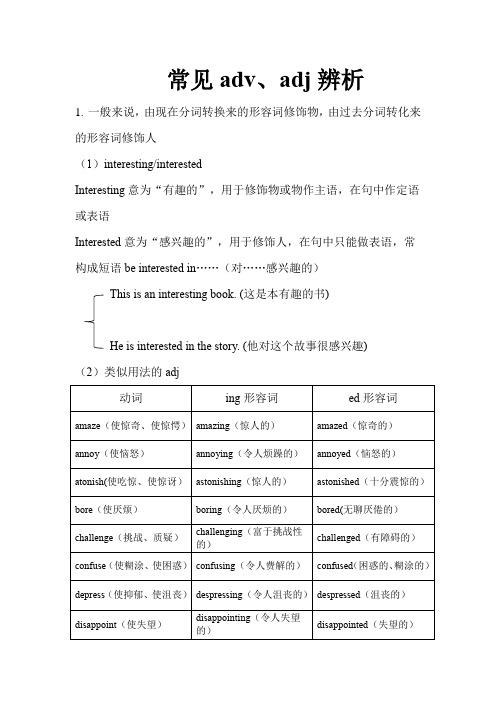
常见adv、adj辨析1.一般来说,由现在分词转换来的形容词修饰物,由过去分词转化来的形容词修饰人(1)interesting/interestedInteresting意为“有趣的”,用于修饰物或物作主语,在句中作定语或表语Interested意为“感兴趣的”,用于修饰人,在句中只能做表语,常构成短语be interested in……(对……感兴趣的)This is an interesting book. (这是本有趣的书)He is interested in the story. (他对这个故事很感兴趣)(2)类似用法的adj2.常见形容词、副词辨析(1)alone、lonelyAlone:独自的(地)、单独的(地),强调无人陪伴,既为形容词又为副词。
只能作表语(alone做副词时可以做状语)。
Lonely:“孤独的、寂寞的”含有感情色彩,为形容词。
可做定语或表语。
He lives alone,but he doesn’t feel lonely.This is a lonely island.作定语,“荒凉的、偏僻的”She is alone at home.(她独自一人在家。
)(2)asleep、sleepy、sleepingasleep/sleeping意为睡着的,asleep只能作表语,构成fall asleep(睡着);sleeping可作表语、定语,另外,还为动名词。
sleepy“困倦的、想睡的”可作表语、定语,构成feel sleep(感觉困倦)。
When my mother came home last night,I was asleep.Who is the sleeping man.I felt sleepy all day.(3)living、alive、lively、liveA.alive意思是“活着的、有生命的”一般作表语或后置定语,多用于修饰人;living意思是“活着的、健在的”可作表语和前置定语。
知识点形容词与副词总结
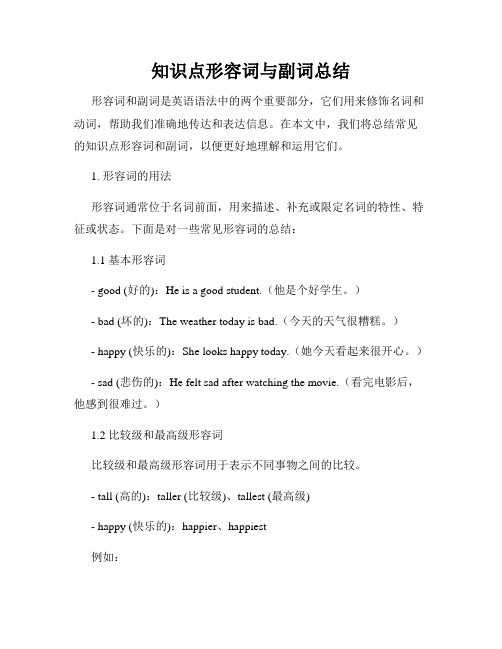
知识点形容词与副词总结形容词和副词是英语语法中的两个重要部分,它们用来修饰名词和动词,帮助我们准确地传达和表达信息。
在本文中,我们将总结常见的知识点形容词和副词,以便更好地理解和运用它们。
1. 形容词的用法形容词通常位于名词前面,用来描述、补充或限定名词的特性、特征或状态。
下面是对一些常见形容词的总结:1.1 基本形容词- good (好的):He is a good student.(他是个好学生。
)- bad (坏的):The weather today is bad.(今天的天气很糟糕。
)- happy (快乐的):She looks happy today.(她今天看起来很开心。
)- sad (悲伤的):He felt sad after watching the movie.(看完电影后,他感到很难过。
)1.2 比较级和最高级形容词比较级和最高级形容词用于表示不同事物之间的比较。
- tall (高的):taller (比较级)、tallest (最高级)- happy (快乐的):happier、happiest例如:- He is taller than his brother.(他比他的兄弟高。
)- She is the happiest person in the room.(她是房间里最快乐的人。
)1.3 泛指和特指形容词泛指形容词用于描述没有具体限制的事物,而特指形容词用于描述特定的事物。
- some (一些):He bought some apples.(他买了一些苹果。
)- this (这个):This book is interesting.(这本书很有趣。
)2. 副词的用法副词通常用来修饰动词、形容词或者其他副词,用来表达方式、时间、原因等。
2.1 副词修饰动词- slowly (慢慢地):He walks slowly.(他走得很慢。
)- quickly (快速地):She runs quickly.(她跑得很快。
形容词和副词的辨析
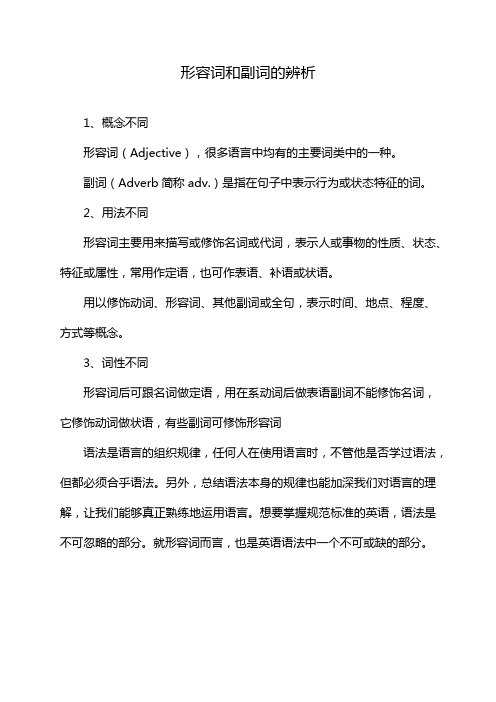
形容词和副词的辨析
1、概念不同
形容词(Adjective),很多语言中均有的主要词类中的一种。
副词(Adverb简称adv.)是指在句子中表示行为或状态特征的词。
2、用法不同
形容词主要用来描写或修饰名词或代词,表示人或事物的性质、状态、特征或属性,常用作定语,也可作表语、补语或状语。
用以修饰动词、形容词、其他副词或全句,表示时间、地点、程度、方式等概念。
3、词性不同
形容词后可跟名词做定语,用在系动词后做表语副词不能修饰名词,它修饰动词做状语,有些副词可修饰形容词
语法是语言的组织规律,任何人在使用语言时,不管他是否学过语法,但都必须合乎语法。
另外,总结语法本身的规律也能加深我们对语言的理解,让我们能够真正熟练地运用语言。
想要掌握规范标准的英语,语法是不可忽略的部分。
就形容词而言,也是英语语法中一个不可或缺的部分。
形容词与副词的辨析

形容词与副词的辨析在英语中,形容词和副词是两个常见的词类。
它们在句子中扮演着不同的角色,对于准确地表达意思来说,我们需要对形容词和副词进行辨析。
本文将讨论形容词与副词在用法上的区别,并给出一些实例来帮助读者更好地理解这两种词类。
一、定义及用法区别形容词是一类用来修饰名词或代词的词。
它们描述或限定名词的性质、状态或特征。
形容词通常位于名词前面,帮助我们更好地了解所描述的名词。
例子:1. She has a beautiful garden.2. He is a talented musician.副词是一类用来修饰动词、形容词、其他副词或整个句子的词。
它们用来描述动作的方式、程度、频率、时间等。
例子:1. She sings beautifully.2. He worked hard.总结来说,形容词描述名词的特征,而副词描述动作的方式、程度等。
二、辨析方法1. 词尾辨析形容词和副词有时通过添加不同的词尾进行区分。
形容词的词尾通常为"-ful"、"-less"、"-ive"、"-able"、"-ous"等。
例子:1. beauty(名词)- beautiful(形容词)- beautifully(副词)2. success(名词)- successful(形容词)- successfully(副词)2. 位置辨析在句子中的位置也是辨析形容词和副词的方法之一。
形容词通常位于名词前面,而副词通常位于动词或形容词后面。
例子:1. They have a big house.(形容词修饰名词)2. He runs quickly.(副词修饰动词)3. 用法辨析根据具体的句意和语境,我们可以判断应该使用形容词还是副词。
例子:1. She speaks loud/loudly.(这里应使用副词loudly来描述动作方式)2. The flower smells good/well.(这里应使用形容词good来描述名词的特征)三、常见例子下面是一些形容词和副词在句子中的常见用法:1. fast(形容词):He is a fast runner.(形容词修饰名词)2. fast(副词):He runs fast.(副词修饰动词)3. quick(形容词):She is a quick thinker.(形容词修饰名词)4. quickly(副词):She thinks quickly.(副词修饰动词)5. hard(形容词):He is a hard worker.(形容词修饰名词)6. hard(副词):He works hard.(副词修饰动词)通过以上例子,我们可以看出形容词和副词的具体用法和辨析方法。
2019中考英语总复习课件(人教版):形容词和副词类单词、词组辨析

【举例】 I am a bit / little hungry. 我有点饿。 I think I’m getting a bit / little better each day. 我觉得我每 天都在好转。 A bit / little is enough for me. 我有一点儿就够了。 There is a little water in the bottle.=There is a bit of water in the bottle. 瓶子里有一点水。 He is not a little (=very)hungry. 他饿极了。 He is not a bit (=not at all)hungry. 他一点也不饿。
形容词和副词类单词、词组辨析
1. a bit, a little 【辨析】 这两个词都意为“一点儿”, 有时可以互换, 但有时不能。 (1)两者作程度副词修饰形容词、副词、动词或比较级时, 意义相同, 意为“一点儿;有些”。 (2)两者都可以用作名词词组, 充当主语或宾语。 (3)a little可直接修饰不可数名词, 而a bit后面必须加of才可 以。 (4)否定形式 not a little 作状语时, 相当于very / quite, 意为 “很;非常”;作定语和宾语时, 相当于much, 意为 “许 多”。而not a bit 作状语时, 相当于not at all, 意为“一点 也不”;作宾语时, 则相当于not much, 意为“不多;不怎么
【演练】
( C )1. I just want to ____ to be 120 years old.
A. living
B. alive
C. live
D. lively
( A )2. The concert will be broadcasted ____.
高考英语语法知识总结形容词和副词
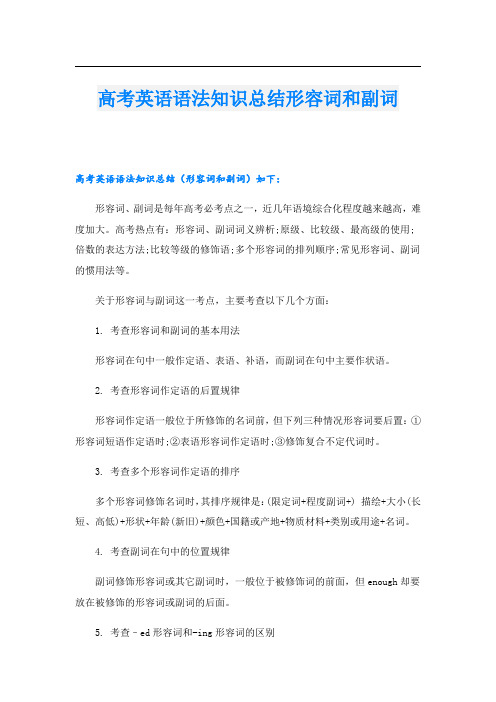
高考英语语法知识总结形容词和副词高考英语语法知识总结(形容词和副词)如下:形容词、副词是每年高考必考点之一,近几年语境综合化程度越来越高,难度加大。
高考热点有:形容词、副词词义辨析;原级、比较级、最高级的使用;倍数的表达方法;比较等级的修饰语;多个形容词的排列顺序;常见形容词、副词的惯用法等。
关于形容词与副词这一考点,主要考查以下几个方面:1. 考查形容词和副词的基本用法形容词在句中一般作定语、表语、补语,而副词在句中主要作状语。
2. 考查形容词作定语的后置规律形容词作定语一般位于所修饰的名词前,但下列三种情况形容词要后置:①形容词短语作定语时;②表语形容词作定语时;③修饰复合不定代词时。
3. 考查多个形容词作定语的排序多个形容词修饰名词时,其排序规律是:(限定词+程度副词+) 描绘+大小(长短、高低)+形状+年龄(新旧)+颜色+国籍或产地+物质材料+类别或用途+名词。
4. 考查副词在句中的位置规律副词修饰形容词或其它副词时,一般位于被修饰词的前面,但enough却要放在被修饰的形容词或副词的后面。
5. 考查–ed形容词和-ing形容词的区别-ed形容词,通常说明人,意为“(某人)感到……”;-ing形容词通常说明事物,意为“(某事物)令人……”或“令人……的(事物)”。
6. 考查两种不同形式的副词的用法差异即考查与形容词同形的副词与形容词后加ly构成的副词的区别。
7. 考查形容词和副词的比较等级。
8. 考查比较等级的修饰语。
考点1:在具体的语境中辨析形容词与副词的语义从复现的频率来看,此点是高考对形容词、副词考查的第一大热点。
解答此类题关键是要分析具体的语境,结合基本词义、搭配等来选择正确的答案。
经过统计,常见常考的形容词和副词有(按频度排列):even; interested; interesting; yet; hardly; just; therefore; though; too; very; common; effective; either; ever; fair; however; less; more; nearly; only; purposefully; rather; still; such; surprised; surprising 还有以下形容词和副词应当熟悉和掌握: a good many; a number of; acceptable; accidentally; actively; adequately; already; another; anxious; anyway; ashamed; attentively; bad; badly; besides; better; but; careful; changeable; cheap; comfortable; convenient; eagerly; easy; encouraging; enha-ncing; equal; even though; eventually; fairly; far; fewer; following; formally; friendly; gen-erously; gradually; heavily; historic; hopefully; immediately; inaccessible; individual; inevit-able; initial; instead; invisible; largely; never; next; no; normal; nowadays; obviously; ordin-ary; other; otherwise; patient; plenty of; prac-tical; promoting; proper; quickly; readily; reasonable; remote; seldom; seriously; short; so; stimulating; traditional; unavailable; unav-oidable; unfavorable; unfortunately; usual; va-rious; weak; well考点2:考查形容词、副词的比较级、最高级及前面的修饰语【备考清单】1) 比较级、最高级的选用及应用范围比较级、最高级常用于表示两者或多者间的比较。
英语形容词和副词归纳总结

英语形容词和副词归纳总结英语中的形容词和副词是用来描述名词、动词或其他形容词的词语。
它们在句子中起到修饰和限定的作用,使得表达更加准确和生动。
本文将对英语形容词和副词进行归纳总结,以帮助读者更好地理解和运用这些词语。
一、形容词(Adjectives)形容词用于描述名词,用来说明名词的性质、状态、特征等。
形容词可以直接修饰名词,也可以通过系动词(如am, is, are, feel等)与名词构成系表结构。
形容词通常放在名词前面,用来修饰名词并提供更多信息。
1. 基本形容词基本形容词是最常见的一种形容词,它们用来描述事物的性质和特征。
比如:beautiful(美丽的)、happy(快乐的)、big(大的)等。
2. 比较级形容词比较级形容词表示比较程度,用于将两个或多个事物进行比较。
常见的比较级形容词有:bigger(更大的)、happier(更快乐的)、more beautiful(更美丽的)等。
3. 最高级形容词最高级形容词表示某一事物在数量或质量上达到最高程度。
常见的最高级形容词有:the biggest(最大的)、the happiest(最快乐的)、the most beautiful(最美丽的)等。
二、副词(Adverbs)副词用于修饰动词、形容词、副词或整个句子,用来说明一种动作的方式、程度、时间、频率等。
副词的作用是使句子更加准确和详细。
1. 基本副词基本副词是最常见的一类副词,它们一般以-ly结尾,并用来修饰动词或形容词。
例如:quickly(快速地)、happily(快乐地)、carefully (小心地)等。
2. 程度副词程度副词用来表示动作或状态的强度或程度。
常见的程度副词有:very(非常)、too(过于)、extremely(极其)等。
3. 时间副词时间副词用来描述动作发生的时间或频率。
常见的时间副词有:often(经常)、always(总是)、sometimes(有时候)等。
形容词和副词类单词词组辨析概要

A. nicely
B. well
C. good
D. badly
( C )2. That’s a ______ place to have fun.
A. wonderfully
B. terribly
C. good
D. well
( C )3. His sister is a ______ singer. She sings _____.
附:(1)如果有only, just,quite等词修饰,我们通常 说only / just / quite a few / little。
(2)a little还可以修饰形容词或副词的原级和比较级, 如:a little fat有点胖;a little faster 更快一点点。
【举例】 I read a few books of this famous writer recently.
瓶子里面几乎没有墨水了,我得去买些。
【应用】
( D )1. It is good for the fish to have ____ water plants in the tank (鱼缸)to keep the water pure.
A. little
B. a little C. few
D. aloud
( A )3. Please read the letter _____ so that everybody can hear you.
A. aloud
B. loud
C. loudly
D. aloudly
★3. be famous as...,be famous for...,be famous to... 【解析】
形容词和副词类单词、词组辨析
形容词和副词的区别是什么

形容词和副词的区别是什么在英语语法中,形容词和副词是两种常见的词性。
它们在句子中扮演不同的角色,并且有着不同的用法和功能。
本文将详细介绍形容词和副词的区别。
1. 定义和用途形容词是一类用来修饰名词或代词的词,用以描述名词的特征、性质或状态。
形容词通常用于名词前作定语,用来限定或修饰名词。
例如:a beautiful flower(一朵美丽的花)。
副词是一类用来修饰动词、形容词、副词或整个句子的词,用以表示行为的方式、程度、频率、时间等。
副词可以修饰整个句子,也可以修饰其他词性的词。
例如:She runs quickly.(她跑得快)2. 修饰对象形容词主要修饰名词,用来描述或限定名词的属性或特征。
形容词通常放在名词前面,也可以放在系动词之后作表语。
例如:a tall building(一座高楼);The book is interesting.(这本书很有趣)副词主要修饰动词、形容词或其他副词,用来描述或修饰这些词的程度或方式。
副词可以放在句子中的不同位置,具体位置取决于所修饰的词。
例如:She speaks loudly.(她大声说话);He drives very slowly.(他开车非常慢)3. 形态变化形容词的形态变化相对较为固定,通常有三个级别:原级(表示基本的属性或状态)、比较级(表示相对程度的比较)和最高级(表示最高程度的比较)。
形容词的比较级和最高级往往通过在词尾加-er和-est来构成,也可以在形容词前面加more和most来构成。
例如:big (大)- bigger(更大)- biggest(最大);beautiful(美丽的)- more beautiful(更美丽的)- most beautiful(最美丽的)副词的形态变化相对简单,大多数副词只有一个形态,不进行比较级和最高级的变化。
一些副词也可以通过在词尾加-er和-est来构成比较级和最高级。
若副词与形容词形态相同,则需要在词前加副词修饰词,如more或most。
形容词和副词辨析如何辨析形容词和副词

形容词和副词辨析如何辨析形容词和副词专题三形容词和副词形容词和副词的辨析和正确使用是运用这门语言正确表词达意很关键的一部分,用错地方或表错感情也许会造成很大的误解,下面就平时最常用常考的词汇作精要分析。
1. a few/few/a little/little四者都表示数量“少”。
(1) a few, few 用来修饰可数名词;a little, little 用于修饰不可数名词。
例如:a. The man has been here for many years, so he has a few friends.这个人在这里住了很多年了,他有一些朋友。
b. There is a little water in the glass.杯子里有一些水。
(2) a few, a little 有一些,表示肯定概念;few, little 几乎没有,表示否定意义。
例如:a. They have a little ink, don"t they? 他们有一点墨水,是吗?b. They have little ink, do they? 他们几乎没有墨水,是吗?c. She has a few Chinese friends, doesn"t she? 他有几位中国朋友,是吗?d. She has few Chinese friends, does she? 他几乎没有几位中国朋友,是开吗另外:little 作形容词,还有“小”的意思。
例如:Jerry is a little mouse. Jerry是只小老鼠。
2. big/ large/ great上述形容词都表示" 大" ,但侧重点及程度不同。
(1) big指具体事物的大小,强调比正常形体的标准大,既可用在普通场合,也可用在正式场合。
它可用来指人的身材高大或" 长大了" ,还可表示"伟大" ," 重要" 之意。
中考英语形容词和副词考点归纳与例析资料讲解

中考英语形容词和副词考点归纳与例析资料讲解中考英语形容词和副词考点归纳与例析中考英语形容词和副词考点归纳与解析【重点讲解】形容词用来修饰名词,说明事物或人的性质或特征。
大多数形容词有比较等级的变化,可分为原级、比较级和最高级三种基本形式,用来表示事物的等级差别。
副词在句子中主要修饰动词、形容词、副词或整个句子。
副词按词汇意义可分为方式副词、程度副词、地点副词、时间副词和频度副词等。
分别用于表示状态、程度、场所、时间。
副词也有比较等级的变化,其规则形式与形容词的相同。
掌握形容词和副词的基本用法要注意以下几点:1、有些形容词加-ly可构成副词。
但由名词加-ly结尾的是形容词,如friendly,lovely, likely,lively等。
2、形容词、副词的比较级等级的变化。
1)规则变化:①单音节词和少数双音节词一般在词尾加-er/ estsmall——smaller——smallest; clever——cleverer——cleverest②辅音字母+y结尾的,把y变成i加-er / est:easy——easier——easiest; heavy——heavier——heaviest③词尾以一个辅音字母结尾的重读闭音节单词,双写该辅音字母,然后加-er/ est:big——bigger——biggest; hot——hotter——hottest④多音节词和部分双音节词,在词前加上more/ most:slowly——more slowly——most slowly;interesting——more interesting——most interesting2)不规则变化:3、表示比较的几种句型:句型1:“比较级+ than ”,例如:You are taller than I.They lights in your room are brighter than those in mine.句型2:“as + 原级+ as”,否定句中可用so… as例如:Tom is as tall as his father.He cannot run so/as fast as you.句型3:“最高级+ in/of…”,例如:The Changjiang River is one of the longest rivers in the world.Peter is the tallest player of the three.4、可修饰比较级的词有much, even, far, still, rather, by far, a bit, a little, a lot,a great deal等。
中考英语备考形容词副词词义辨析归纳汇总

中考英语备考形容词副词词义辨析归纳汇总形容词(短语)副词:1. 形容词(Adjectives)是用来描述名词的词语。
常见的形容词有:beautiful (美丽的),smart (聪明的),brave (勇敢的)等。
2. 形容词短语(Adjective Phrases)是由形容词构成的短语。
常见的形容词短语有:in the middle of (在…中间),on top of (在…上方),at the end of (在…末尾)等。
3. 副词(Adverbs)是修饰动词、形容词、副词、句子等的词语。
常见的副词有:quickly (快速地),loudly (大声地),carefully (小心地)等。
词义辨析:1. care, concern, worry: 这三个词都表示担心或关心。
其区别在于care更偏重于对他人的关心,concern更偏重于对他人的担忧,而worry则更强调对一些具体问题的担心。
3. big, large, huge: 这三个词都表示大的、巨大的。
其区别在于big是最常用的一种词语,可以用于各个领域;large则更偏重于尺寸大、宽阔的意思;huge则表示非常巨大、庞大。
归纳汇总:常见形容词(Adjectives):1. beautiful (美丽的)2. smart (聪明的)3. brave (勇敢的)4. tall (高的)5. kind (善良的)6. funny (有趣的)7. strong (强壮的)8. difficult (困难的)10. delicious (美味的)常见形容词短语(Adjective Phrases):1. in the middle of (在...中间)2. on top of (在...上方)3. at the end of (在...末尾)4. next to (紧挨着)5. in front of (在...前面)6. behind the door (在门后)7. under the table (在桌子下面)8. on the left/right (在左边/右边)9. at the back of (在...背后)10. in the corner (在角落里)常见副词(Adverbs):1. quickly (快速地)2. loudly (大声地)3. carefully (小心地)4. slowly (慢慢地)5. nicely (好好地)6. quietly (安静地)7. happily (快乐地)8. easily (容易地)9. hard (努力地)10. well (好地)这些词语的理解和运用对于中考英语备考很有帮助。
词汇专题(1):英语高考词汇辨析及易错词汇辨析之形容词和副词
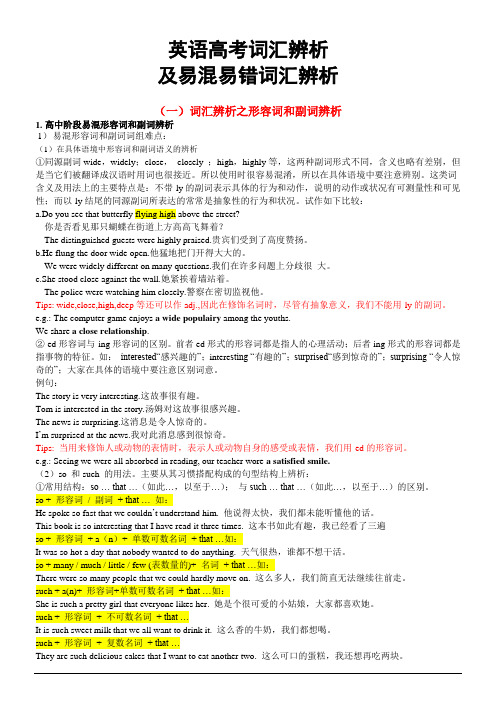
英语高考词汇辨析及易混易错词汇辨析(一)词汇辨析之形容词和副词辨析1.高中阶段易混形容词和副词辨析1)易混形容词和副词词组难点:(1)在具体语境中形容词和副词语义的辨析①同源副词wide,widely;close,closely ;high,highly等,这两种副词形式不同,含义也略有差别,但是当它们被翻译成汉语时用词也很接近。
所以使用时很容易混淆,所以在具体语境中要注意辨别。
这类词含义及用法上的主要特点是:不带-ly的副词表示具体的行为和动作,说明的动作或状况有可测量性和可见性;而以-ly结尾的同源副词所表达的常常是抽象性的行为和状况。
试作如下比较:a.Do you see that butterfly flying high above the street?你是否看见那只蝴蝶在街道上方高高飞舞着?The distinguished guests were highly praised.贵宾们受到了高度赞扬。
b.He flung the door wide open.他猛地把门开得大大的。
We were widely different on many questions.我们在许多问题上分歧很大。
c.She stood close against the wall.她紧挨着墙站着。
The police were watching him closely.警察在密切监视他。
Tips: wide,close,high,deep等还可以作adj.,因此在修饰名词时,尽管有抽象意义,我们不能用-ly的副词。
e.g.: The computer game enjoys a wide populairy among the youths.We share a close relationship.②-ed形容词与-ing形容词的区别。
前者ed形式的形容词都是指人的心理活动;后者ing形式的形容词都是指事物的特征。
词语以及短语辨析

词语以及短语辨析hard: 形容词& 副词lovely 可爱的friendly 友好的hardly: 几乎不nearly: 几乎不late: 迟的,晚的lately 最近(副词)latest 最新的close 近的(close to)closely 仔细地expect 盼望,期望except 除了...depend on 依靠leave for 离开去某地laugh at 嘲笑hear from 收到...的信go over 复习get over 克服look at 看look after 照顾look for 寻找look into 调查look up 查找(字典)look though 浏览break out 爆发break up 打碎,分解break down 毁掉,垮掉cheer up 使振奋,使兴奋get up 起床get off 下车get on 上车set off 出发grow up 长大dress up 打扮make up 编造,组成,化妆give away 赠送,暴露move away 搬走take away 带走,拿走take off 起飞take out 取出,拿出put away 把...收起来hand out 分发give out 分发hand in 收上来hold on 坚持,等一会pass on 传递给... pass away 去世pick up 捡起put on 穿上put off 推迟Put away 把...收起来stay up熬夜turn on 打开turn off 关掉turn up 把声音调高turn down把声音调低wake up醒来watch out 小心come up with 提出,想出come out 出现,出来find out 查明真相do well in =be good at 擅长get on well with 与...相处融洽go on with 继续做...look forward to +doing 盼望做...make friends with 和...交朋友take part in..= join 参加take care of 照顾take pride in = be proud of 以...为自豪be different from 与...不同be active in 在...方面积极lose heart 灰心lose one’s heart to 痴心于...be ready to 乐于做...be ready for 为...做好准备give up 放弃come up 提出keep on 继续做...alone 独自地,单独地lonely 孤单的,寂寞的find 找到(强调结果)look for 寻找(强调过程)discover 发现(强调已经存在,人们不知道的东西)invent 发明(强调从未存在过的..)How long 时间多久,或物体多长。
初中英语知识点归纳词汇与词义辨析
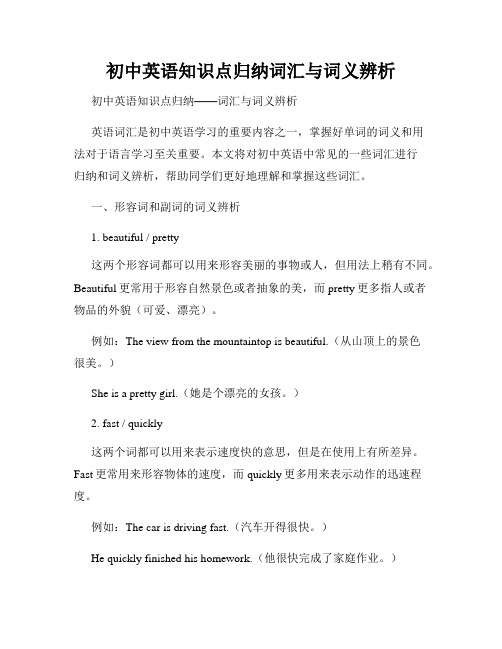
初中英语知识点归纳词汇与词义辨析初中英语知识点归纳——词汇与词义辨析英语词汇是初中英语学习的重要内容之一,掌握好单词的词义和用法对于语言学习至关重要。
本文将对初中英语中常见的一些词汇进行归纳和词义辨析,帮助同学们更好地理解和掌握这些词汇。
一、形容词和副词的词义辨析1. beautiful / pretty这两个形容词都可以用来形容美丽的事物或人,但用法上稍有不同。
Beautiful更常用于形容自然景色或者抽象的美,而pretty更多指人或者物品的外貌(可爱、漂亮)。
例如:The view from the mountaintop is beautiful.(从山顶上的景色很美。
)She is a pretty girl.(她是个漂亮的女孩。
)2. fast / quickly这两个词都可以用来表示速度快的意思,但是在使用上有所差异。
Fast更常用来形容物体的速度,而quickly更多用来表示动作的迅速程度。
例如:The car is driving fast.(汽车开得很快。
)He quickly finished his homework.(他很快完成了家庭作业。
)3. high / tall这两个形容词都可以用来描述高度,但用法略有差别。
High更多指垂直的高度,而tall更多指人或物的相对高度。
例如:The airplane is flying high in the sky.(飞机在高空中飞行。
)He is a tall boy.(他是个高个子的男孩。
)二、动词的词义辨析1. bring / take这两个动词都有"带来"的意思,但在使用时要根据说话人的位置和目的地来判断使用哪一个。
Bring表示"把某物带到说话人所在的地方",而take表示"把某物带到与说话人不在同一地方"。
例如:Please bring your book to me.(请把你的书带给我。
中考英语备考形容词(短语)副词词义辨析归纳汇总
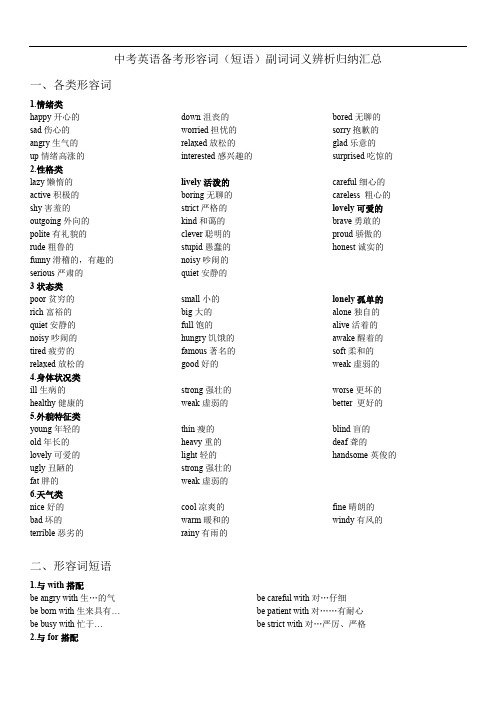
中考英语备考形容词(短语)副词词义辨析归纳汇总一、各类形容词1.情绪类happy开心的sad伤心的angry生气的up情绪高涨的down沮丧的worried担忧的relaxed放松的interested感兴趣的bored无聊的sorry抱歉的glad乐意的surprised吃惊的2.性格类lazy懒惰的active积极的shy害羞的outgoing外向的polite有礼貌的rude粗鲁的funny滑稽的,有趣的serious严肃的lively活泼的boring无聊的strict严格的kind和蔼的clever聪明的stupid愚蠢的noisy吵闹的quiet安静的careful细心的careless 粗心的lovely可爱的brave勇敢的proud骄傲的honest诚实的3状态类poor贫穷的rich富裕的quiet安静的noisy吵闹的tired疲劳的relaxed放松的small小的big大的full饱的hungry饥饿的famous著名的good好的lonely孤单的alone独自的alive活着的awake醒着的soft柔和的weak虚弱的4.身体状况类ill生病的healthy健康的strong强壮的weak虚弱的worse更坏的better 更好的5.外貌特征类young年轻的old年长的lovely可爱的ugly丑陋的fat胖的thin瘦的heavy重的light轻的strong强壮的weak虚弱的blind盲的deaf聋的handsome英俊的6.天气类nice好的bad坏的terrible恶劣的cool凉爽的warm暖和的rainy有雨的fine晴朗的windy有风的二、形容词短语1.与with搭配be angry with生…的气be born with生来具有…be busy with忙于…be careful with对…仔细be patient with对……有耐心be strict with对…严厉、严格2.与for搭配be bad for对……有害be famous/ known for因……而出名be late for迟到be/get ready for为……做准备be sorry for为……感到抱歉、遗憾be thirsty for渴望…3.与to搭配be friendly to对…友好be harmful to对……有害be similar to与…相似4.与of搭配be afraid of害怕…be fond of喜欢…be full of充满…be proud of为……感到自豪be tired of厌烦…5.与about搭配be crazy about对……着迷be excited about因……而激动be sure about对……有把握be worried about为……担心6.其他be good at擅长…be mad at对……感到生气be surprised at对……感到惊讶be hard on对……严苛be interested in对……感兴趣三、各类副词1.-ly结尾的副词actually实际上bravely勇敢地certainly肯定地carelessly粗心地badly 严重地;恶劣地busily忙碌地carefully小心地clearly清晰地closely紧密地easily容易地exactly准确地finally 最终happily快乐地immediately立刻lately最近luckily幸运地nearly几乎possibly可能地quickly迅速地really真正地suddenly突然地confidently自信地especially尤其excitedly兴奋地freely自由地heavily重地kindly亲切地loudly大声地mainly主要地politely礼貌地;客气地properly合适地quietly安静地recently最近safely安全地2.频度副词twice两次daily天天,常常always总是,经常every day每天every week每周every month每月weekly每周,每周一次usually通常sometimes有时ever曾经not … any more/ longer不再again and again一次又一次at times 有时,间或now and then偶尔never从来不often 经常,常常3.时间副词now现在then然后today今天tomorrow明天before以前ago以前late晚,迟soon很快once曾经,以前still仍然yesterday昨天already已经early早点immediately立即,立刻4.地点副词here这儿there那儿left左边right右边north北边south南边east东边upstairs楼上downstairs楼下above上方behind后面everywhere每个地方anywhere任何地方west西边5.程度副词quite相当,完全,十分rather相当,颇,有点儿very非常too太much许多a lot许多a little一点儿,一些a bit少量enough足够so这样,这么hardly几乎不almost几乎6.表“也,又”的副词too 一般用于肯定句,常放在句末,用逗号隔开as well 一般用于肯定句,常放在句末also 常放在be动词、情态动词或助动词之后,行为动词之前either 用于否定句,常放在句末,用逗号隔开四、特殊形式的形容词、副词。
形容词和副词类单词词组辨析概要共54页

形容词和副词类单词词组辨析概要
•Байду номын сангаас
6、黄金时代是在我们的前面,而不在 我们的 后面。
•
7、心急吃不了热汤圆。
•
8、你可以很有个性,但某些时候请收 敛。
•
9、只为成功找方法,不为失败找借口 (蹩脚 的工人 总是说 工具不 好)。
•
10、只要下定决心克服恐惧,便几乎 能克服 任何恐 惧。因 为,请 记住, 除了在 脑海中 ,恐惧 无处藏 身。-- 戴尔. 卡耐基 。
谢谢!
51、 天 下 之 事 常成 于困约 ,而败 于奢靡 。——陆 游 52、 生 命 不 等 于是呼 吸,生 命是活 动。——卢 梭
53、 伟 大 的 事 业,需 要决心 ,能力 ,组织 和责任 感。 ——易 卜 生 54、 唯 书 籍 不 朽。——乔 特
形容词和副词类单词词组辨析概要共54页文档

1、 舟 遥 遥 以 轻飏, 风飘飘 而吹衣 。 2、 秋 菊 有 佳 色,裛 露掇其 英。 3、 日 月 掷 人 去,有 志不获 骋。 4、 未 言 心 相 醉,不 再接杯 酒。 5、 黄 发 垂 髫 ,并怡 然自乐 。
谢谢你的阅读
❖ 知识就是财富 ❖ 丰富你的人生
71、既然我已经踏上这条道路,那么,任何东西都不应妨碍我沿着这条路走下去。——康德 72、家庭成为快乐的种子在外也不致成为障碍物但在旅行之际却是夜间的伴侣。——西塞罗 73、坚持意志伟大的事业需要始终不渝的精神。——伏尔泰 74、路漫漫其修道远,吾将上下而求索。——屈原 75、内外相应,言行相称。——韩非
- 1、下载文档前请自行甄别文档内容的完整性,平台不提供额外的编辑、内容补充、找答案等附加服务。
- 2、"仅部分预览"的文档,不可在线预览部分如存在完整性等问题,可反馈申请退款(可完整预览的文档不适用该条件!)。
- 3、如文档侵犯您的权益,请联系客服反馈,我们会尽快为您处理(人工客服工作时间:9:00-18:30)。
【应用】
( B )1. The music is too ______. Please turn it down.
A. loudly
B. loud
C. aloud
D. aloudly
( B )2. Don’t talk so ______.
A. loud
B. loudly
C. aloudly
A. everyweek
B. everyday
C. every day
D. a day
( B )3. How do you go to school ______?
A. Monday
B. every day
C. everyday
D. weekday
★5. good,well 【解析】
两者都有“好”的意思。good是形容词,意为“好 的”。well作副词时意为“好地”;作形容词时意为“身 体好的;健康的”;作名词时意为“井”;well还可以作 语气词。 【举例】
( C )2. Please don’t leave me ______. A. lonesome B. lone C. alone D. lonely
( A )3. He felt even ______ in the middle of this modern city even though he didn’t live ______.
【举例】 Don’t read aloud in the library. 不要在图书馆里大声
朗读。 Please speak louder,or no one can hear you. 请
大声点讲,否则没有人能听到你的声音。 Suddenly the bell on the wall rang loudly. 突然,墙
A. lonelier; alone
B. more alone; lonely
C. lonelier; alonely
D. alone; lonely
★2. aloud,loud,loudly 【解析】
(1)aloud作副词,意为“出声地;大声地”,常与 read,call等动词连用,强调为了使人听见而发声,但声 音不一定很大,通常不用于进行比较。
I don’t see her every day. 我不是每天都见到她。
【应用】
( B )1. She was dressed in her ______ clothes at the party.
A. every day
B. everyday
C. casually
D. usually
( C )2. She can’t be with him ______.
famous意为“著名的;闻名的”,相当于known / well-known。be famous as...意为“作为……而著名”。 be famous for...意为“以……而著名”。 be famous to sb. 意为“广为人知的;大家都熟悉的” 。 【举例】
Song Zuying is famous / known / well-known as a great singer. 宋祖英作为一位了不起的歌唱家而闻名。
C. as
D. at
★4. everyday,every day 【解析】
everyday是形容词,意为“每天的;日常的”,后 面要接被修饰的名词。every day是副词,意为“每天” 放在句首或句末,用来修饰整个句子。 【举例】
In our everyday (daily) life,we don’t very often meet an elephant. 在日常生活中,人们很少见到大象。
【应用】
( B )1. The old peasant lived in a(n) ______ village far away,and he often feels ______.
A. alone; lonely
B. lonely; lonely
C. alone; alone
D. lonely; alone
形容词和副词类单词、词组辨析
★1. alone,lonely 【解析】
alone作形容词或副词,意为“独自的(地);独立的 (地);单独的(地)”,作表语或状语,不可作定语。 lonely 作形容词,意为“孤单的;寂寞的;孤寂的”,既可作 表语又可作定语。 【举例】
He likes living alone. 他喜欢独居。 He is alone,but he doesn’t feel lonely. 他独自一人, 但并不感到寂寞。
A. as
B. for
C. to
D. in
( C )2. He is famous ______ a great inventor.
A. to
B. for
C. is famous ______ everyone in America.
A. for
B. to
(2)loud作副词,意为“响亮地;高声地”,常与 speak,talk,sing,laugh等动词连用,强调音量大、传 播远,常用比较级形式。loud也可以作形容词,意为 “大声的”。
(3)loudly作副词,意为“响亮地”,其基本意义与 loud 相同,还常与 ring,knock 等动词连用,含有“喧 闹”或“嘈杂”的意味。
D. aloud
( A )3. Please read the letter _____ so that everybody can hear you.
A. aloud
B. loud
C. loudly
D. aloudly
★3. be famous as...,be famous for...,be famous to... 【解析】
Chongqing is famous / known / well-known for its spicy food. 重庆以其辣的食物而闻名。
Chairman Mao is famous to every Chinese. 毛主席的 名字广为人知(中国人都知道毛主席)。
【应用】
( B )1. Guilin is famous ______ her beautiful mountains and rivers.
